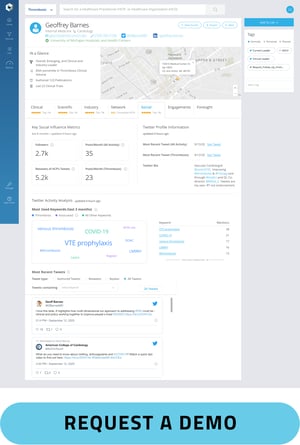Doctors Are Tweeting. Are You Listening?

 Like the rest of the population, social media consumes a growing portion of physicians' time. According to a recent survey by Klick Health, nearly two-thirds of physicians spend more than one hour per day on social media, and 74% of doctors start the day on their phones. What’s more, four out of five physicians use social media daily in their practice, with 31% saying an online post from a key opinion leader influenced how they practiced in recent months.
Like the rest of the population, social media consumes a growing portion of physicians' time. According to a recent survey by Klick Health, nearly two-thirds of physicians spend more than one hour per day on social media, and 74% of doctors start the day on their phones. What’s more, four out of five physicians use social media daily in their practice, with 31% saying an online post from a key opinion leader influenced how they practiced in recent months.
What should medical affairs teams make of these trends? As healthcare professionals increasingly embrace social media channels to connect with peers and obtain informative medical content, it’s never been more important to understand the conversations and activities taking place on social media sites. This is even more crucial amid the pandemic.
Indeed, emerging social media trends have only accelerated during the COVID-19 pandemic. In the face of shelter-in-place orders and social distancing, health-related online conversations have spiked. Disease-state discussions jumped 2,500% among consumers and 1,000% among HCPs between January and March, with the two groups sharing the same types of health-related content, according to a recent survey by Fierce Pharma.
This presents significant challenges for medical affairs professionals.
For instance, most congresses and medical meetings will be held online for the foreseeable future, requiring scientific information to be disseminated and discussed via virtual platforms rather than in-person presentations and poster sessions. Since in-person meetings are no longer an option, physicians are instead turning to digital channels such as Twitter, LinkedIn, and Reddit to find the latest news and information or connect with their peers to ask questions and discuss new science.
As COVID-19-related restrictions continue to diminish in-person access to physicians well into next year, life sciences companies will be required to distribute the latest scientific information about their products online. Given this dependency on digital communications, HCP expectations for online engagement have never been greater.
In the face of this rapidly changing environment, medical affairs teams are scrambling to identify how best to ensure scientific findings reach key audiences as well as to shift their influencer engagement activities – including through social listening capabilities.
By leveraging tools that enable the focused tracking of online conversations about specific therapeutic areas, medical affairs teams can:
- Find emerging and established influential digital opinion leaders for studies, advisory board seats, and medical partnerships.
- Bolster medical science liaison pre-call planning and expand field team capabilities to reach this new segment of online influencers.
- Tailor the medical affairs engagement strategy to meet online audience expectations by analyzing online conversations about specific topics and concepts.
- Reach HCPs who are otherwise difficult to engage by connecting with digital opinion leaders they follow online.
Social media analysis isn’t just about listening. To make sense of the data extracted, it is important to identify signals and conversations that can enable timely engagement.
Social Media Insights in Aperture
By using therapeutic area–specific keywords, Komodo Health can identify HCP Twitter influencers in the context of a given therapeutic area. Komodo also has established a rating system for its new social media insights tool that scores each Twitter account reviewed based on shares, comments, and followers. This social media influencer score enables the identification of top influencers in a particular therapeutic area.
A digital opinion leader’s sphere of influence often transcends traditional geographic boundaries and can impact global perceptions of different therapies or clinical approaches. Examining the far-reaching, social media conversation can provide a glimpse into broad emerging trends and how discussions in one market can impact clinicians in another.
Such insights can help medical affairs professionals guide strategies to reach and engage these digital opinion leaders.
For instance, social media–based insights can help identify rising stars, who can then be tapped for thought leadership. When viewed in the context of other signals available through Aperture, including clinical insights, scientific research, and industry engagement, a fuller picture emerges of the physician behind an individual social media account.
If a physician is highly active on social media and sees many patients in a specific therapeutic area, yet has no prior thought leadership, they may be a rising star worth exploring for relationship development. This HCP may never have been identified previously using traditional analysis tools, but by tracking and analyzing their social media data, they emerge as a new influencer who can, by extension, help spread information and messaging to other HCPs online.
Through a thorough analysis of trending topics, teams can likewise refine messaging and communications strategies to support timely interactions with physicians and even shape influential online conversations. Furthermore, tracking product mentions can provide real-world evidence of product use and performance.
As physicians continue to turn to social media, the need for medical affairs teams to leverage social listening tools to extract meaningful insights will continue to grow. Given the ability to find and engage with top influencers and modify core messaging based on trending topics, medical affairs teams can provide strategic direction for companies to navigate this rapidly changing environment.
Be sure to reach out to Komodo Health to find out more about how social media insights can be used by medical affairs teams to identify new influencers online.




